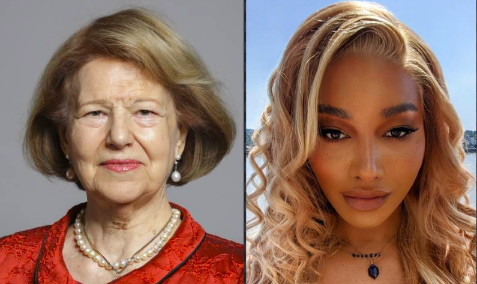Baroness Nicholson has denied accusations that she is transphobic (Creative Commons/Instagram @munroebergdorf)
Tory peer Baroness Nicholson has invited the trans activist Munroe Bergdorf for lunch after calling her a “weird creature” on Twitter.
Nicholson appeared on BBC Radio 4’s Today programme in the wake of a transphobia and racism row that saw her dropped as the honorary vice president of the Booker Prize.
She addressed the backlash over her offensive comments to Bergdorf, and suggested that they could find common ground if they met in person.
“I never meant any tweet to cause sadness and misery, and it’s clear that inadvertently that has done so,” she said.
“I didn’t know [Bergdorf], I didn’t recognise her eminence, her past with L’Oréal, her past with the NSPCC, and the major work she has done to help other people,” she continued.
“I respect that and I’m asking her if we could have a meal together, maybe we might find we have a lot in common, you never know.”
She also denied all allegations of racism, homophobia and transphobia, saying that she had a “lifetime commitment” to equality and diversity and considers herself a feminist “in the broadest sense of the word”.
“I’m not transphobic,” she insisted. “I fully support [trans people’s] rights and everyone else’s rights.”
Earlier this month, Baroness Nicholson – who has been a life peer since 1997 – was widely condemned after launching an astonishing attack on equal marriage.
She suggested that the introduction of same-sex marriage in 2013 has degraded “the status of women and of girls… as a binary class”, saying nothing of the fact the law has given thousands of lesbian and bisexual women the right to marry other women.
When asked to explain how two men or two women marrying “degrades” women’s rights, she echoed a classic homophobic catchphrase.
“I support marriage and family life as the way to offer happiness for most people,” she tweeted. “In the UK for at least 2,000 years and more that has meant a man and a woman.”
